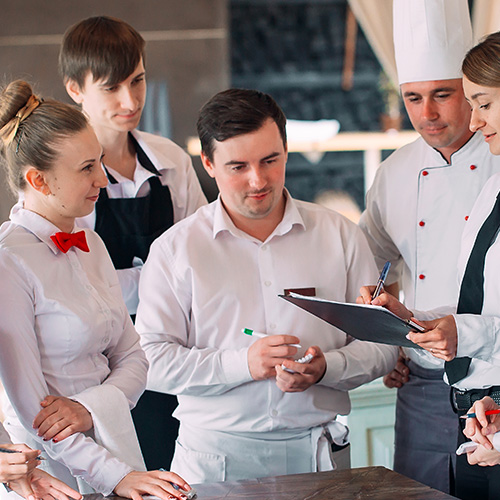
Building an effective work culture in your restaurant is an integral aspect of the hospitality industry, encompassing the values and behaviors that define a dining establishment. It influences everything from the ambiance and service to the menu offerings and overall guest experience. Understanding and cultivating a positive restaurant culture is essential for creating a welcoming and memorable dining environment for both employees and patrons.
What Is Restaurant Culture?
Restaurant culture encompasses the values, beliefs, norms, and practices that shape the environment within a restaurant. It is a reflection of the establishment's identity that can be seen in the overall customer experience. Restaurant culture is built on teamwork, creativity, communication, and a shared commitment to delivering exceptional dining experiences. This work culture sets the tone for employee interactions, customer interactions, and the overall atmosphere of the restaurant.
Importance of Restaurant Culture

Restaurant workplace culture plays a pivotal role in shaping the success and identity of any dining establishment. Creating a positive and vibrant work culture is more than just a trend, it is a fundamental aspect that can significantly impact the overall performance and reputation of a restaurant. Here are some key reasons why restaurant culture is of utmost importance:
- Employee Morale and Engagement: A strong restaurant culture fosters a sense of belonging and purpose among employees. When staff members feel valued, respected, and motivated, they are more likely to be engaged in their work, leading to improved productivity and customer service.
- Customer Experience: Restaurant culture directly influences the customer experience. A positive culture can create a welcoming and enjoyable atmosphere for guests, encouraging repeat visits and positive word-of-mouth recommendations.
- Brand Identity: The work culture of a restaurant defines its brand identity and sets it apart from competitors. Whether it's a fine dining establishment with a focus on elegance and sophistication or a casual eatery with a laid-back and friendly vibe, the workplace culture shapes how customers perceive your restaurant.
- Team Cohesion and Collaboration: A well-defined restaurant culture promotes teamwork, communication, and collaboration among staff members. This cohesion is essential for ensuring smooth operations, consistency in service, and the ability to adapt to challenges effectively.
- Retention and Recruitment: A positive restaurant culture can attract top talent in the industry and improve employee retention rates. When employees feel connected to the values and mission of the restaurant, they are more likely to stay loyal and contribute to its long-term success.
- Adaptability and Innovation: A dynamic restaurant culture that encourages creativity and innovation can drive continuous improvement and keep the business competitive in a rapidly evolving industry. By embracing change and new ideas, restaurants can stay ahead of trends and meet the evolving needs of customers.
How to Build a Restaurant Culture

Building a strong workplace culture is essential for creating a positive work environment, enhancing customer experiences, and ultimately driving business success. Here are some key steps to help you build a thriving restaurant culture:
- Define Your Core Values: Start by identifying the core values that represent what your restaurant stands for. These values should guide the behaviors, decisions, and interactions of your team members. Write a restaurant mission statement that outlines these values and can be referenced by your staff.
- Lead by Example: As a restaurant owner or manager, it's crucial to embody the values and behaviors you want to see in your team. Your actions and attitudes will set the tone for the rest of the staff.
- Communicate Openly: Foster a work culture of open communication where team members feel comfortable sharing their ideas, concerns, and feedback. Regular team meetings, one-on-one check-ins, and suggestion boxes can help facilitate communication.
- Provide Training and Development: Investing in the professional development of your employees shows that you value their growth and success. Providing training opportunities, workshops, and mentorship programs can help employees enhance their skills and advance in their careers.
- Foster Creativity: Encourage creativity and innovation within your team by providing opportunities for employees to share their ideas and contribute to the growth of the business. Recognize and reward creative thinking and empower team members to take risks and try new approaches.
- Be Inclusive and Diverse: Create an inclusive and diverse environment where all team members feel respected, valued, and supported. Embrace diversity in all its forms and celebrate the unique perspectives and backgrounds that each individual brings to the table.
How to Boost Morale to Improve Restaurant Culture
Boosting morale is a crucial aspect of improving restaurant culture. A positive work environment can lead to increased productivity, higher employee retention rates, and better customer service. Here are some effective strategies to boost morale in your restaurant:
1. Recognize and Reward
 Acknowledge and reward employees for their hard work, dedication, and achievements. Recognition can come in various forms, such as verbal praise, bonuses, or opportunities for advancement. Here are some key facts to consider when implementing a recognition and reward system in your restaurant:
Acknowledge and reward employees for their hard work, dedication, and achievements. Recognition can come in various forms, such as verbal praise, bonuses, or opportunities for advancement. Here are some key facts to consider when implementing a recognition and reward system in your restaurant:
- Celebrate Successes: Celebrate both individual and team successes to boost morale and foster a sense of camaraderie among your staff. Whether it's hitting a sales target or achieving a milestone, take the time to recognize and celebrate achievements to help reduce employee turnover.
- Personalized Recognition: Tailoring your recognition efforts to each employee can make a significant impact. Acknowledge their specific contributions, whether it's going above and beyond in customer service, demonstrating leadership skills, or consistently meeting targets.
- Public Recognition: Publicly acknowledging employees in front of their peers can boost morale and foster a sense of camaraderie within the team. This can be done during staff meetings, through a shout-out board in the break room, or via a digital platform where employees can give virtual high-fives to their colleagues.
- Incentive Programs: Implementing incentive programs such as employee of the month awards, performance bonuses, or gift cards for exceptional performance can motivate employees to strive for excellence. These programs can also create healthy competition among team members.
- Professional Development Opportunities: Offering opportunities for professional growth and development can be a valuable form of recognition. This could include sponsoring employees to attend industry conferences, providing training sessions, or offering tuition reimbursement for further education.
2. Team-Building Activities
Becoming a chef requires a major time commitment. Cooks and serving staff may spend more time in a week with their coworkers than with friends and family. Restaurant teams are often referred to as a “family of misfits.” This is why it is important to organize team-building activities and social events that help foster camaraderie and teamwork among employees. Here are some ideas for team-building activities that can help improve morale within your restaurant:
- Happy Hour: Organizing a happy hour for your team can be a fun and relaxing way to bring everyone together outside of work hours. It provides an opportunity for team members to socialize in a more casual setting, which can help strengthen relationships and build a sense of community among staff. Due to restaurant hours, you may have to separate your team into groups so there are enough staff members to manage the establishment while a group is attending happy hour.
- Team Meal: Your chefs and line cooks spend most of their time preparing meals for customers. Show appreciation for them by having a meal provided for them instead. Whether it's a potluck lunch, a catered dinner, or a meal that management prepares, sharing a meal together can create a sense of unity and collaboration within the team.
- Volunteer Day: Giving back to the community through a volunteer day can not only boost morale but also instill a sense of pride and purpose among team members. Participating in volunteer activities together can help strengthen relationships, build empathy, and foster a sense of teamwork outside of the restaurant setting.
- Fun Competition: Organizing a friendly competition among team members can inject some excitement and energy into the workplace. Whether it's a cooking challenge, a trivia night, or a sports tournament, fun competitions can encourage teamwork, creativity, and friendly rivalry among staff members.
3. Employee Wellness Initiatives

Employee wellness is a key factor in creating a positive restaurant culture that fosters productivity and satisfaction among staff members. Implementing employee wellness initiatives can significantly boost morale and improve overall work performance. By prioritizing the well-being of your employees, you can create a healthier and more engaged workforce.
- Gym Memberships: Your staff will be working on their feet for long hours in a hot kitchen. Physical fitness is a crucial part of working in a fast-paced foodservice environment. Providing gym memberships or access to fitness classes as part of employee benefits can encourage staff members to stay active and maintain a healthy lifestyle. Physical activity has been proven to reduce stress, increase energy levels, and improve mental health, all of which contribute to a positive work environment.
- Healthy Snacks: Promoting healthy eating habits in the workplace by offering nutritious snacks and meals can have a positive impact on employee wellness. Providing access to fresh fruits, vegetables, and other healthy options can help employees make better food choices and maintain a balanced diet, leading to improved energy levels and productivity.
- Work-Life Balance: Encouraging work-life balance is difficult in a busy kitchen but is essential for promoting employee wellness. When possible, offering flexible work schedules and paid time off can help employees manage their personal and professional responsibilities more effectively. By prioritizing work-life balance, you can reduce burnout, increase job satisfaction, and enhance overall employee well-being.
Back to Top
Understanding restaurant culture is essential for creating a thriving establishment. By fostering a positive work environment, promoting teamwork, and prioritizing customer satisfaction, restaurants can cultivate a workplace culture that not only attracts customers but also retains talented staff members. Embracing diversity, fostering community, and maintaining high standards of service are key components of a vibrant restaurant culture that can lead to long-term success.
.




